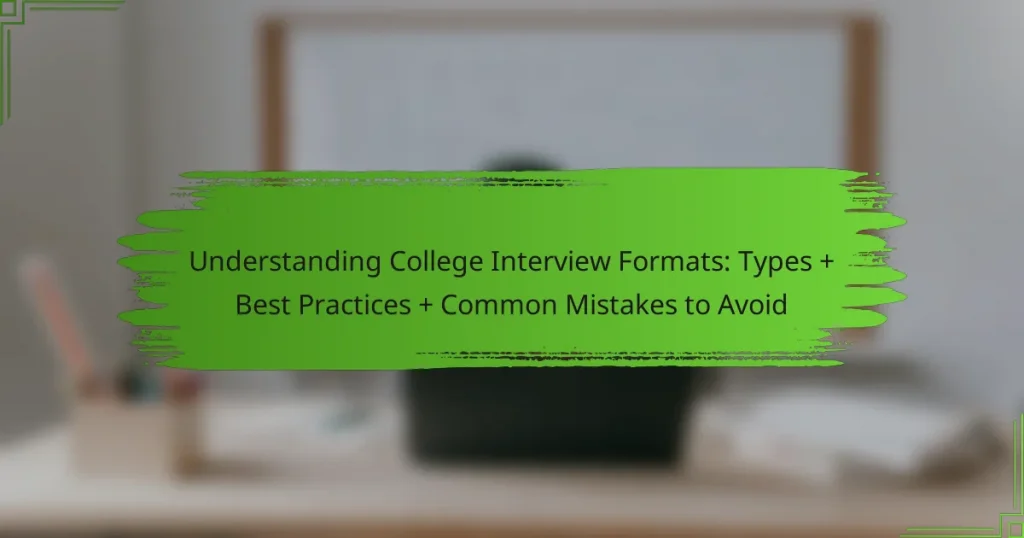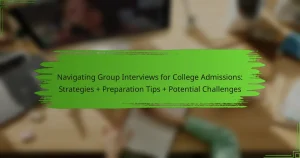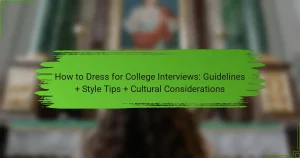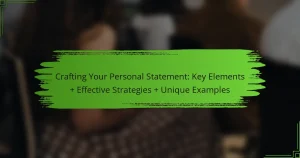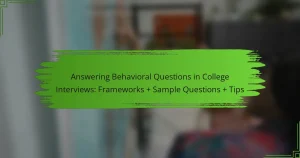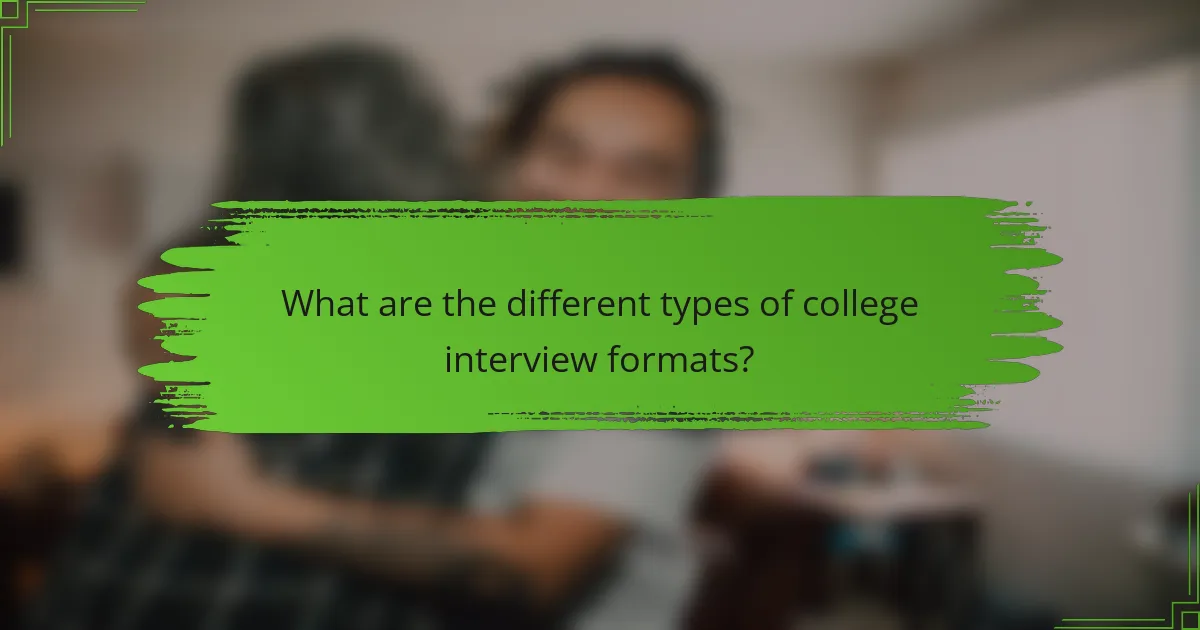
What are the different types of college interview formats?
The different types of college interview formats include in-person interviews, virtual interviews, and group interviews. In-person interviews occur face-to-face at the college campus or a designated location. Virtual interviews are conducted online through video conferencing platforms. Group interviews involve multiple candidates being interviewed simultaneously, often assessing collaboration and communication skills. Each format aims to evaluate a candidate’s suitability for the college. They allow admissions officers to gauge personality, fit, and potential contributions to the campus community.
How do traditional one-on-one interviews work?
Traditional one-on-one interviews involve a direct conversation between an interviewer and a candidate. The interviewer asks questions to assess the candidate’s qualifications and fit for a role. Candidates respond with their experiences, skills, and motivations. This format allows for in-depth discussion and personal interaction. Interviews typically follow a structured or semi-structured format. The interviewer may use a set of predetermined questions or adapt based on the candidate’s responses. This approach helps gauge both technical skills and cultural fit. One-on-one interviews are common in college admissions processes. They provide an opportunity for candidates to showcase their personality and interests.
What are the key characteristics of one-on-one interviews?
One-on-one interviews are characterized by direct interaction between an interviewer and a single interviewee. This format allows for in-depth exploration of the interviewee’s thoughts and experiences. The setting is typically private, promoting open communication. Questions can be tailored based on the interviewee’s responses. This flexibility encourages a conversational tone, fostering rapport. One-on-one interviews also enable the interviewer to gauge non-verbal cues effectively. The duration can vary, often lasting from 30 minutes to an hour. Research indicates that this format is effective for assessing personal attributes and fit for college programs.
What should candidates expect during a one-on-one interview?
Candidates should expect a structured conversation during a one-on-one interview. The interviewer will likely ask questions about the candidate’s background and experiences. Candidates may discuss their academic achievements and extracurricular activities. Interviewers often evaluate communication skills and thought processes. Candidates should prepare for behavioral questions that assess problem-solving abilities. The interview may also include questions about the candidate’s interest in the college. Candidates should expect to ask questions about the institution as well. Overall, the interview aims to assess fit and interest in the college.
What is a panel interview and how does it differ from other formats?
A panel interview is a type of job interview where multiple interviewers assess a single candidate simultaneously. This format allows for diverse perspectives on the candidate’s qualifications. Typically, panel interviews include representatives from different departments or roles within an organization. This contrasts with one-on-one interviews, where a single interviewer evaluates the candidate alone. Panel interviews can provide a more comprehensive view of how a candidate might fit into the team. They also allow for a more efficient interview process, as multiple decision-makers can gather insights at once. In contrast, group interviews involve multiple candidates being interviewed together, which fosters competition rather than collaboration among interviewers.
What are the roles of panel members in a panel interview?
Panel members in a panel interview serve distinct roles. Each member evaluates candidates based on specific criteria. One member often focuses on technical skills relevant to the position. Another may assess cultural fit within the organization. A third panelist might concentrate on interpersonal skills and communication abilities. The roles can vary depending on the organization’s needs. This structured approach ensures a comprehensive evaluation of the candidate. By having diverse perspectives, panel interviews enhance decision-making quality. Research shows that panel interviews lead to better hiring outcomes due to varied insights.
How can candidates prepare for a panel interview?
Candidates can prepare for a panel interview by researching the interviewers and the institution. Understanding the panel’s background helps tailor responses. Practicing common interview questions can boost confidence. Candidates should also prepare specific examples that demonstrate their skills. Dress professionally to make a good impression. Arriving early shows punctuality and respect. Lastly, candidates should be ready to engage with multiple interviewers simultaneously. This preparation strategy enhances overall performance during the interview.
What is a group interview and what are its unique features?
A group interview is a format where multiple candidates are interviewed simultaneously by a panel or interviewer. This method allows interviewers to assess candidates’ interpersonal skills, teamwork, and communication abilities in real-time. Unique features of group interviews include the dynamic interaction among candidates, which can reveal leadership qualities and problem-solving skills. Additionally, the format often includes group activities or discussions that require collaboration. This setting can create a competitive atmosphere, as candidates may feel the need to stand out among their peers. Group interviews are commonly used in college admissions and job recruitment processes to evaluate how candidates perform in a group setting.
How does a group interview assess candidates differently?
A group interview assesses candidates differently by evaluating their interpersonal skills and teamwork abilities in a collaborative setting. In this format, multiple candidates are interviewed simultaneously, allowing interviewers to observe interactions. Candidates must demonstrate communication skills while engaging with peers. This setting reveals how candidates handle conflict and contribute to group discussions. It also allows interviewers to assess leadership potential and adaptability in real-time scenarios. Research shows that group interviews can predict job performance more accurately by simulating workplace dynamics. This method highlights candidates’ strengths and weaknesses in a way that individual interviews may not capture.
What strategies can candidates use to stand out in a group interview?
Candidates can stand out in a group interview by demonstrating strong communication skills. They should actively engage with both interviewers and fellow candidates. Making eye contact and using open body language can enhance their presence. Additionally, candidates can showcase their unique skills relevant to the position. Providing specific examples from past experiences can illustrate their qualifications. Asking insightful questions shows genuine interest in the role and company. Being respectful and supportive of others can also create a positive impression. Finally, candidates should practice good time management to ensure they contribute meaningfully without dominating the conversation.
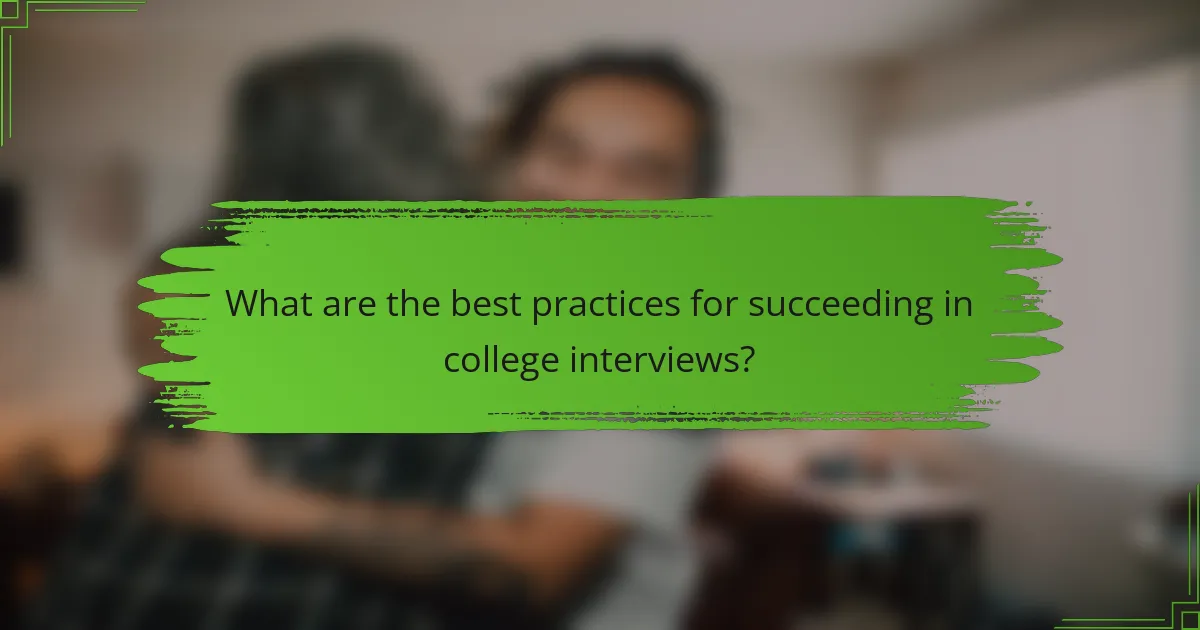
What are the best practices for succeeding in college interviews?
To succeed in college interviews, preparation and practice are essential. Research the college thoroughly to understand its values and programs. Prepare answers for common interview questions, focusing on personal experiences and motivations. Practice with mock interviews to build confidence and improve delivery. Dress appropriately to make a positive first impression. Arrive early to demonstrate punctuality and respect for the interviewer’s time. Engage with the interviewer by asking thoughtful questions about the college. Follow up with a thank-you note to express appreciation for the opportunity. These practices can significantly enhance performance during college interviews.
How can candidates effectively prepare for their interviews?
Candidates can effectively prepare for their interviews by researching the institution and its values. Understanding the college’s mission helps tailor responses. Practicing common interview questions is crucial for confidence. Role-playing with a friend or mentor can simulate the interview experience. Candidates should prepare thoughtful questions to ask the interviewer. This demonstrates engagement and interest in the college. Dressing appropriately is important to make a good first impression. Lastly, candidates should review their application materials to discuss them fluently. These steps enhance preparedness and improve performance during interviews.
What research should candidates conduct before the interview?
Candidates should research the college’s mission and values. Understanding these elements helps align personal goals with the institution’s objectives. Candidates should also review the program specifics, including curriculum and faculty. This knowledge allows for informed questions during the interview. Additionally, candidates should investigate recent news about the college. Awareness of current events demonstrates genuine interest. Networking with alumni can provide insider perspectives on the interview process. Finally, practicing common interview questions prepares candidates effectively. Researching these areas significantly enhances candidates’ confidence and performance in interviews.
How can candidates practice their interview skills?
Candidates can practice their interview skills through mock interviews. Mock interviews simulate real interview conditions. They can be conducted with friends, family, or career services. This practice helps candidates refine their answers and body language. Recording these sessions provides valuable feedback. Reviewing recorded interviews allows candidates to identify areas for improvement. Additionally, utilizing online resources can offer practice questions. Engaging in peer interviews can also enhance confidence and communication skills.
What are the key behaviors to exhibit during an interview?
Key behaviors to exhibit during an interview include maintaining eye contact, displaying confidence, and actively listening. Eye contact shows engagement and interest in the conversation. Confidence can be demonstrated through body language and clear speech. Active listening involves nodding and responding appropriately to the interviewer. Additionally, asking insightful questions reflects genuine interest. Dressing appropriately conveys professionalism. Finally, being punctual demonstrates respect for the interviewer’s time. These behaviors collectively enhance the impression made during the interview.
Why is body language important in interviews?
Body language is important in interviews because it conveys non-verbal cues about a candidate’s confidence and engagement. Positive body language, such as maintaining eye contact and open posture, can enhance a candidate’s perceived professionalism. Research indicates that 55% of communication is non-verbal, highlighting its significance in conveying messages. Employers often interpret body language as an indicator of a candidate’s suitability for a role. For instance, a firm handshake can signal confidence, while slouching may suggest disinterest. Thus, effective body language can significantly influence the interviewer’s perception and decision-making process.
How should candidates handle difficult questions during interviews?
Candidates should approach difficult questions during interviews with composure and clarity. They should take a moment to think before responding. This pause allows for a more thoughtful answer. Candidates can also rephrase the question to ensure understanding. This technique demonstrates active listening. Providing specific examples from past experiences can strengthen their response. It shows practical application of skills. If unsure about a question, candidates should ask for clarification. This approach can lead to a more focused discussion. Lastly, maintaining a positive attitude is essential. It reflects confidence and adaptability in challenging situations.
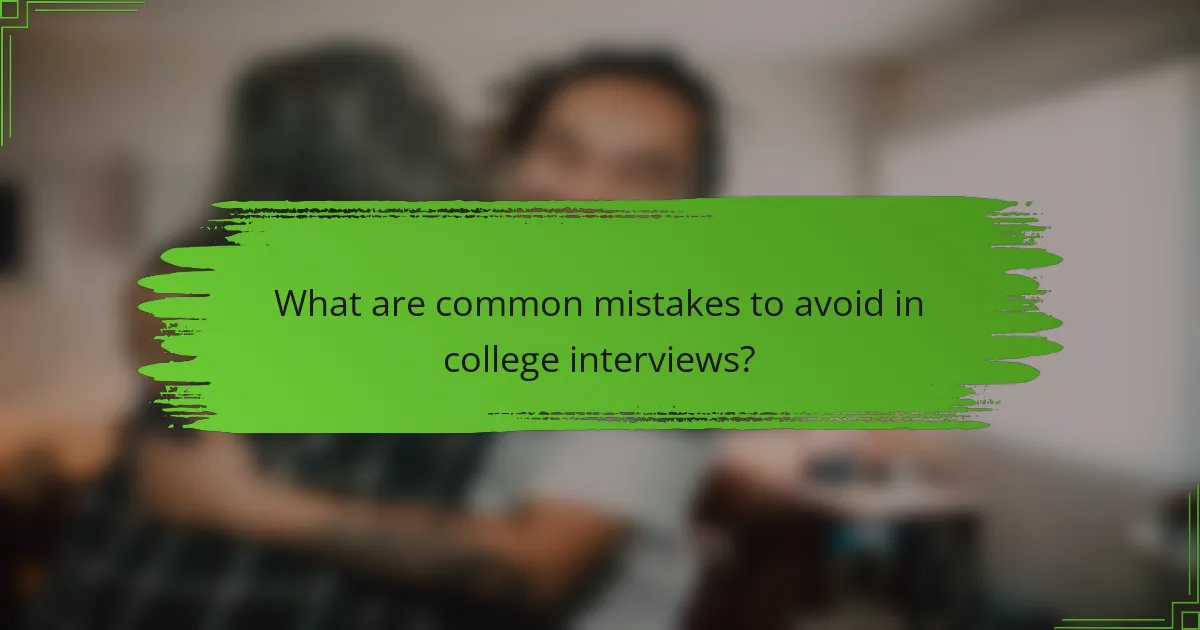
What are common mistakes to avoid in college interviews?
Common mistakes to avoid in college interviews include inadequate preparation and lack of knowledge about the institution. Candidates often fail to research the college’s programs and values. This lack of familiarity can lead to generic answers that do not resonate with interviewers. Another mistake is poor communication skills, such as mumbling or speaking too softly. This can hinder the interviewer’s ability to understand the candidate. Additionally, candidates may arrive late or dress inappropriately, which creates a negative first impression. Not asking questions at the end of the interview is also common. This indicates a lack of interest in the college. Finally, failing to follow up with a thank-you note can be detrimental. It reflects a lack of professionalism and gratitude. Avoiding these mistakes can significantly improve a candidate’s chances of success in college interviews.
What pitfalls should candidates be aware of before the interview?
Candidates should be aware of several pitfalls before the interview. One major pitfall is inadequate preparation. Researching the institution and understanding its values is crucial. Candidates often overlook the importance of practicing common interview questions. This practice helps in articulating thoughts clearly during the interview. Another pitfall is poor time management. Arriving late can create a negative first impression. Additionally, candidates may fail to dress appropriately for the interview setting. Dressing too casually can signal a lack of seriousness. Lastly, not asking questions can indicate disinterest. Engaging with the interviewer through thoughtful questions is essential. These pitfalls can significantly impact a candidate’s performance and overall impression.
How can poor preparation negatively impact an interview?
Poor preparation can significantly hinder an interview’s success. It can lead to a lack of confidence, making the candidate appear unqualified. Inadequate knowledge about the institution can result in irrelevant responses. This disconnect may cause interviewers to doubt the candidate’s genuine interest. Poorly prepared candidates often struggle to articulate their strengths and experiences. This can create a negative impression of their communication skills. Research indicates that candidates who prepare thoroughly are 50% more likely to receive job offers. Therefore, preparation is crucial for demonstrating competence and enthusiasm.
What are the consequences of inappropriate attire or behavior?
Inappropriate attire or behavior during college interviews can lead to negative consequences. Candidates may be perceived as unprofessional or disrespectful. This perception can diminish their chances of being accepted into the college. Additionally, it may create a lasting negative impression on interviewers. Studies show that first impressions are formed within seconds. According to research by Princeton University, it takes just a tenth of a second to form a judgment about someone’s trustworthiness. Thus, inappropriate attire or behavior can significantly impact the outcome of the interview.
How can candidates recover from mistakes made during the interview?
Candidates can recover from mistakes made during the interview by acknowledging the error and addressing it directly. They should remain calm and composed, as this demonstrates professionalism. If a candidate realizes they made a mistake during the interview, they can briefly clarify or correct their response. This shows self-awareness and the ability to think on their feet. Following the interview, candidates can send a thank-you email to the interviewer. In this email, they can reiterate their points and provide additional context if necessary. Research indicates that follow-up communication can positively influence the interviewer’s perception. A study from the National Association of Colleges and Employers found that 80% of employers appreciate a thank-you note. This approach helps candidates leave a positive impression despite prior mistakes.
What steps can candidates take if they stumble over a question?
Candidates can take several steps if they stumble over a question during an interview. First, they should pause and take a deep breath to collect their thoughts. This brief moment can help them regain composure. Next, candidates can ask for clarification or rephrase the question. This ensures they understand what is being asked. If they still struggle, they can take a moment to think before responding. It’s acceptable to say, “Let me take a moment to think about that.” Additionally, candidates can reference related experiences or knowledge to steer their response. This can help them provide relevant information even if they are unsure. Lastly, if they cannot answer, they can express their willingness to follow up later. This shows professionalism and a commitment to providing accurate information.
How important is follow-up communication after an interview?
Follow-up communication after an interview is crucial for several reasons. It demonstrates professionalism and gratitude towards the interviewer. A timely follow-up can reinforce a candidate’s interest in the position. Studies show that candidates who send a follow-up message are perceived more favorably by employers. According to a survey by CareerBuilder, 22% of employers are less likely to hire a candidate who does not send a thank-you note. This highlights the importance of follow-up communication in the hiring process. Additionally, it provides an opportunity to address any points that may not have been fully covered during the interview. Overall, follow-up communication can significantly impact hiring decisions.
What practical tips can help candidates excel in college interviews?
Candidates can excel in college interviews by preparing thoroughly. Research the college’s values and programs to align your answers. Practice common interview questions to build confidence. Dress appropriately to make a good first impression. Arrive early to demonstrate punctuality and enthusiasm. Prepare thoughtful questions to ask the interviewer, showing your interest. Use specific examples from your experiences to illustrate your strengths. Finally, maintain a positive attitude and engage with the interviewer to create a connection.
The main entity of this article is college interview formats, which encompass various types such as in-person, virtual, and group interviews. The article provides an overview of each format, detailing their characteristics and purposes in assessing candidates’ suitability for college admission. It highlights best practices for candidates to excel in interviews, including preparation, communication skills, and appropriate attire, while also identifying common mistakes to avoid. Additionally, the article addresses strategies for handling difficult questions and the importance of follow-up communication after interviews.
